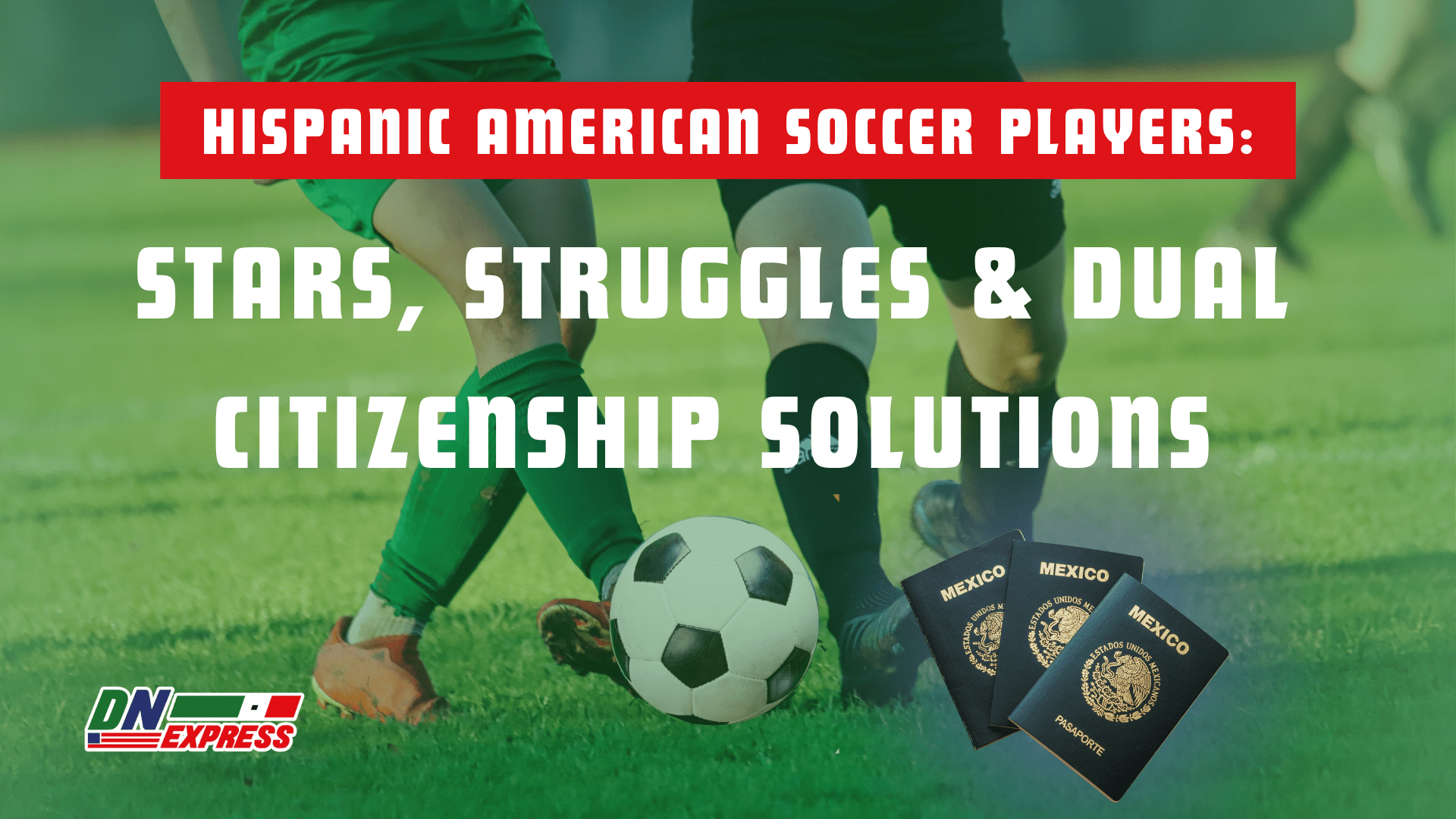
From Gio Reyna to Ricardo Pepi, Hispanic American soccer players are shaping U.S. and Mexican teams. Learn how dual nationality plays a role in their careers, cultural identity, and what steps you can take to claim your own Mexican citizenship as a player or fan.
Whether you're a young athlete chasing a dream, a parent supporting your child's path, or a fan watching your favorite dual-national pick sides, grasping the role of heritage, identity, and paperwork in modern soccer has never been more relevant.
Here's what it means:
- Heritage: U.S.-born players with Mexican ancestry often reclaim Mexican nationality to honor family and unlock professional doors.
- Travel & Mobility: Dual citizenship benefits simplify training, signing contracts, and playing abroad.
- Family Unification: Parents and children can secure cross-border legal identities.
- Consulate Avoidance: Legal services like ours help bypass frustrating delays.
- Legal/Financial Advantages: Citizenship opens property rights, inheritance, and team eligibility in Mexico.
As the founder of Doble Nacionalidad Express, I've worked with athletes, families, and rising stars to untangle the legal side of dual citizenship. From fixing birth certificates to securing Mexican passports, we make sure your paperwork matches your potential, without the headaches of the consulate.
If you want to know why so many Hispanic players are choosing Mexico over the U.S., and how to follow that path yourself, keep reading. We'll cover famous players, overlooked barriers, and how to claim your place on and off the field.
Beyond the Game
There's a unique kind of pride, and pressure, that comes with being a Hispanic American soccer player. You're not representing a team alone.
You're representing two countries, two cultures, and sometimes, two completely different sets of expectations.
For players like Gio Reyna, Ricardo Pepi, or Julian Araujo, the jersey represents more than fabric, it's identity. It reflects not only where they were born, but where their roots are. And behind every national anthem they stand for is a story of paperwork, process, and sometimes, painful decisions.
That's because representation doesn't start on the field, it starts in the documents that say who you are. For many Hispanic American athletes, the choice to play for Mexico goes beyond skill or strategy. It's about family. Culture. Pride. And yes, legal eligibility under FIFA eligibility rules.
But here's what most people miss: before a dual-national athlete can step onto the field for Mexico, they often need to fix a name on a birth certificate, track down missing records, or secure a CURP. And for many, the consulate offers no help.
That's where legal solutions like Doble Nacionalidad Express come in, getting players eligible faster, without the stress.
If you or someone you know is navigating this path, support exists. Below, we'll break down how Hispanic American soccer players are changing the game, and what it takes to get your legal identity in play.
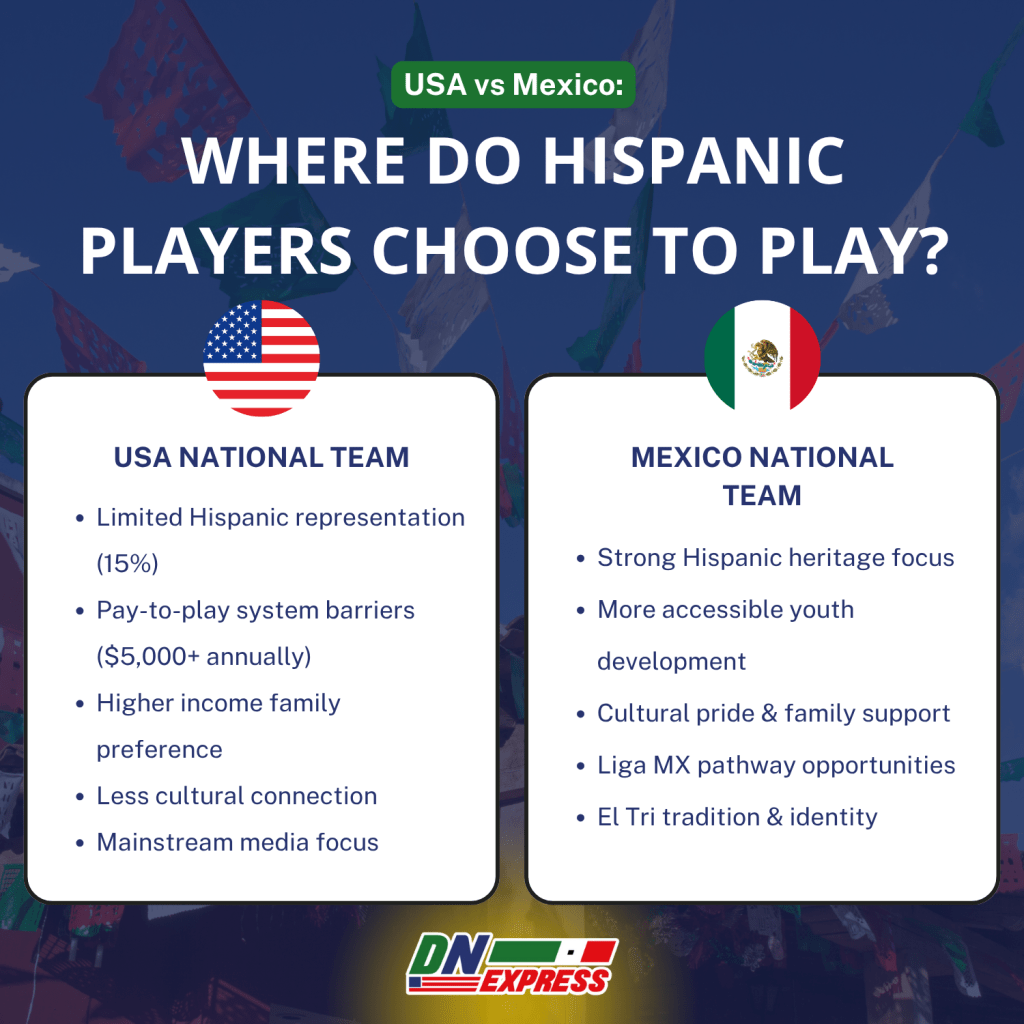
Who Counts as a Hispanic American Soccer Player?
The phrase “Hispanic American” might sound simple, but in the world of soccer, identity proves more complex.
Hispanic typically refers to people with ancestry from Spanish-speaking countries, while Latino more broadly includes people from Latin America, including Brazil. In practice, many athletes use both terms interchangeably, especially in the U.S., where heritage is often blended and fluid.
In soccer, though, identity becomes more formal. It affects which national team you can play for, which passport you hold, and which federation can call you up.
Take Julian Araujo, Alejandro Zendejas, and Efraín Álvarez. All were born in the U.S. to Mexican parents. Culturally, they grew up in two worlds. Legally, they became dual nationals through ancestry, making them eligible for both the U.S. and Mexico.
Here's where it gets even more specific: holding a Mexican passport doesn't always suffice. To represent Mexico officially, players also need to be registered with RENAPO, have a valid CURP, and ensure their documentation is clean and accurate. For example, even a small mistake on a birth certificate can delay eligibility or block a transfer.
Common Question:
“Who is a Hispanic American athlete?” → Athletes like Claudio Reyna, his son Gio Reyna, and Ricardo Pepi all proudly identify as Hispanic American.
They represent a generation raised in the U.S. with roots, and sometimes careers, connected deeply to Latin America.
Whether you're an athlete yourself or a parent supporting one, grasping how heritage, legal status, and eligibility intersect is the first step to owning your place in the game.
Famous Hispanic American Soccer Players (USA & Mexico)
Hispanic American athletes are not only participating in U.S. soccer, they're shaping its future. From household names to emerging talent, these players bring a mix of skill, heritage, and dual identity that reflects the reality of millions of families across the U.S.
Top Current Players
- Gio Reyna. A standout at Borussia Dortmund and a key piece of the USMNT, Gio is the son of Claudio Reyna, another Hispanic American legend.
- Ricardo Pepi. Born in El Paso to Mexican parents, Pepi has played in Europe and MLS and remains a fan favorite for his decisive goals and Mexican-American pride.
- Alejandro Zendejas. After representing both countries at different youth levels, Zendejas committed to Mexico, a decision rooted in personal and cultural identity.
- Brandon Vázquez. A dual national and rising striker, Vázquez is eligible for both the U.S. and Mexico and continues to draw attention from scouts on both sides.
- Julian Araujo. Formerly with LA Galaxy, Araujo switched to represent Mexico and now plays for Las Palmas in Spain, proving how dual nationality opens international doors.
Rising Stars
- Fidel Barajas. At sixteen, Barajas is already turning heads in the Mexican youth national system.
- Diego Kochen. A goalkeeper with FC Barcelona's academy, Kochen represents the next generation of U.S.-born players with Latino roots.
- Santiago Muñoz. With a path that mirrors the movie Goal!, Muñoz left the U.S. to pursue opportunities in Mexico, where his career gained traction.
Representation Gap
Despite this growing list, a concerning pattern remains:
“How many soccer players are Hispanic?” → While Hispanic players make up the majority in youth leagues, especially in places like California, Texas, and Illinois, they remain underrepresented in top-tier U.S. pro teams and national squads.
This disconnect doesn't stem from lack of talent. It's a reflection of systemic issues we'll explore in the next section, as highlighted in Latino youth soccer studies.
Why Are There So Few Hispanic Players in the USMNT?
Walk into any youth soccer tournament in California, Texas, or Illinois, and you'll see a familiar trend: the fields are filled with Latino talent. In fact, in many regions, Hispanic players make up 70% or more of the youth soccer population.
So why doesn't that show up in the U.S. Men's National Team?
The Pay-to-Play Problem
The most frequent barrier is financial.
Competitive youth soccer in the U.S. often requires thousands of dollars in club fees, travel, and uniforms, expenses many Latino families simply can't justify. In contrast, soccer in Latin American countries is more accessible, talent-driven, and community-supported.
“Why are none of them good enough?” The question itself reflects a misconception. The issue proves to be access.
Systemic Bias in Selection
Scouting in the U.S. often favors players from wealthier areas and private academies. Latino kids from working-class communities may never get seen by national scouts or receive the same development support. Language barriers, cultural assumptions, and lack of outreach only widen the gap, as documented in systemic barriers studies.
“Why doesn't the USMNT reflect the Latino population?” Because the selection pipeline filters out too many deserving players before they're even on the radar.
Feeling Unwelcome at the Top
Even those who break through often report feeling sidelined. Hispanic players are less frequently celebrated by mainstream U.S. media and rarely positioned as the face of U.S. soccer, despite having some of the strongest followings within the fanbase.
Some dual nationals ultimately choose to represent Mexico not only for opportunity, but because they feel more seen, valued, and embraced.
This represents a missed opportunity, it's a structural failure. And for many families, navigating the system alone is both overwhelming and unfair.
That's why legal support, outreach, and cultural awareness are necessary if we want true representation at the national level, as highlighted by the U.S. Soccer diversity efforts.
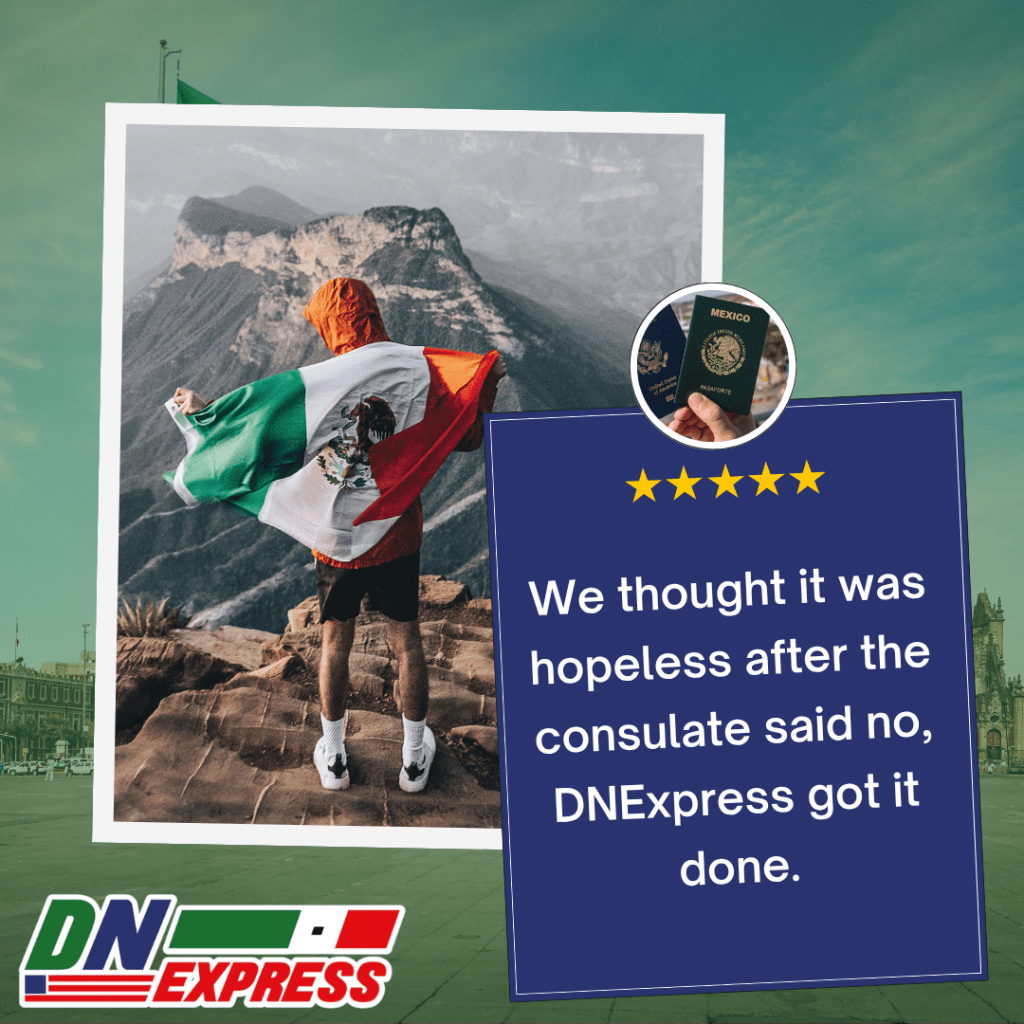
Dual Citizenship & Identity: Why Many Choose Mexico
For many Hispanic American soccer players, the decision to represent Mexico over the U.S. extends beyond opportunity, it's about identity.
Growing up in cities like Los Angeles, Houston, or El Paso, it's common to hear English on the field and Spanish at home. Players navigate both worlds daily. And when it comes time to choose a national team, the question often becomes: Where does my heart belong?
Heritage Runs Deep
Choosing Mexico doesn't always represent a political decision, it's a personal one.
For players like Julian Araujo or Alejandro Zendejas, wearing El Tri goes beyond representing a team. It's about honoring parents, grandparents, and a lineage that shaped their values.
Competitive Opportunity
From a strategic standpoint, many U.S.-born players also see more playing time and upward mobility with Mexico's national teams, especially if they're overlooked in the U.S. system due to bias or lack of exposure.
Liga MX clubs often scout dual nationals early and offer pathways the U.S. development system doesn't.
Family & Cultural Pressure
In many households, choosing Mexico carries emotional weight. Families take pride in their roots, and parents often encourage their kids to pursue opportunities that reflect that heritage. It's common for athletes to say their decision made abuelita cry, in the best way.
Legal Perks of Citizenship
Mexican citizenship goes beyond symbolic, it's practical. It can:
- Qualify a player as a domestic athlete in Liga MX (bypassing foreign player limits)
- Enable seamless travel, residency, and property ownership in Mexico
- Increase eligibility for call-ups and international tournament rosters
That's why securing dual citizenship is often the first step before a player even touches the pitch. But for many, this requires correcting documents, acquiring a CURP, or fixing name discrepancies, a process that can derail a career without the right support.
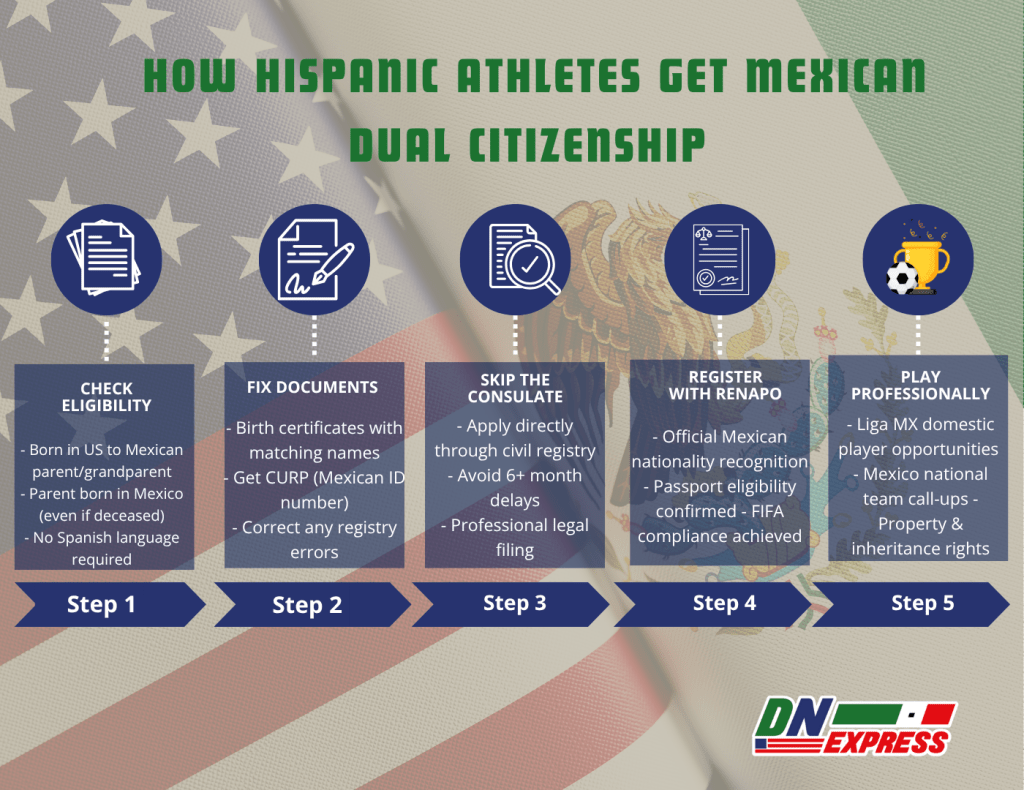
What Dual Citizenship Means (and Why It Matters)
For Hispanic American soccer players, and their families, dual citizenship extends beyond a legal formality. It's a passport to possibility, a connection to culture, and sometimes, the key to an entire career.
Whether you're an athlete aiming to play internationally or a parent trying to secure rights for your child, grasping the real-life impact of dual nationality can help you make informed, empowered decisions.
Heritage
If you were born in the U.S. but have a parent or grandparent born in Mexico, Mexican law allows you to reclaim that nationality.
For many, this goes beyond paperwork, it's about restoring a piece of identity that should've never been lost.
This is especially powerful for athletes who feel torn between two countries. Having dual citizenship allows them to honor both.
Travel & Mobility
Training with a Mexican club? Playing in a youth tournament in Guadalajara? Signing with a team in Toluca?
A Mexican passport makes this seamless. No visas, no complications, freedom to move, compete, and live as a citizen.
Dual nationality also qualifies athletes as “domestic” in Mexico, giving them priority in club selection and team placement.
Family Unification
We often help parents in the U.S. secure Mexican nationality for their U.S.-born children, or vice versa. This ensures that both generations can access healthcare, education, and legal rights across borders. In the world of soccer, it means eligibility extends beyond one side of the family tree.
Consulate Avoidance
Let's be honest, the consulate can be a nightmare. Long waits, incomplete instructions, and conflicting answers keep many families stuck. We help clients skip the consulate entirely by working directly with Mexican civil registries.
That means you can fix documents, claim your nationality, and get your CURP, all from home.
Legal & Financial Advantages
A Mexican passport goes beyond playing soccer. It can also:
- Let you own property or land in restricted zones
- Access inheritance rights from family in Mexico
- Qualify for sponsorships, scholarships, and bonuses tied to nationality
Whether you're looking to build a career or preserve your legacy, dual citizenship is a tool worth securing. However, it's wise to understand the tax implications before making your decision.
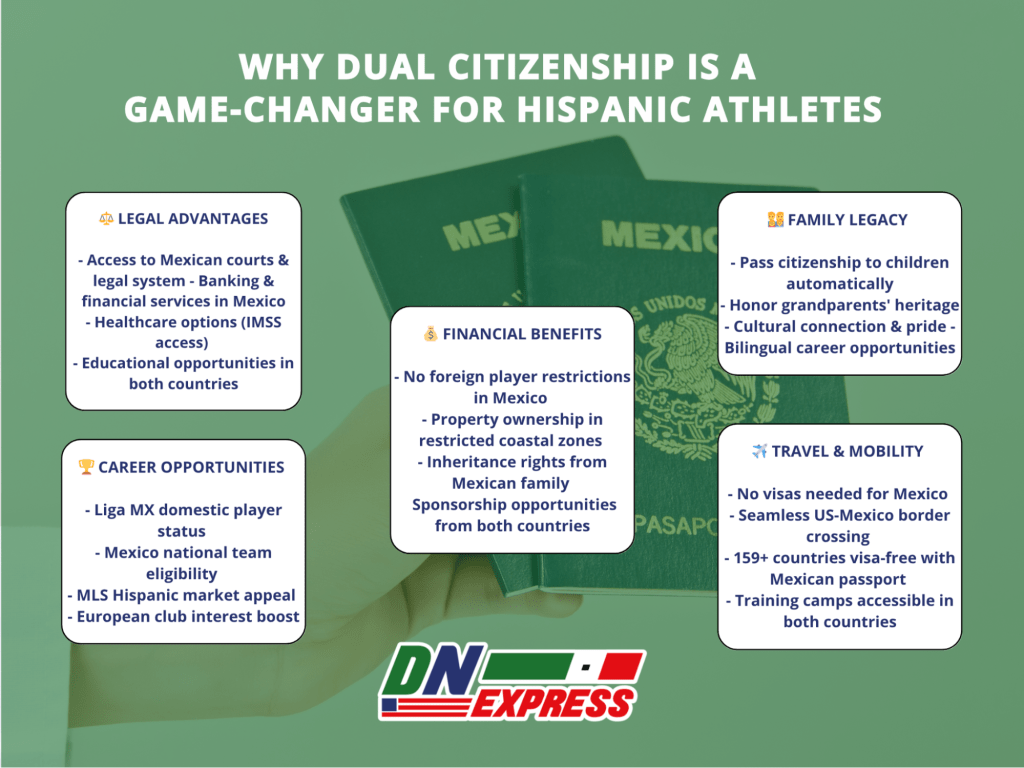
How to Claim Mexican Citizenship as an Athlete (or Parent)
If you're a Hispanic American athlete, or the parent of one, gaining Mexican citizenship can open doors to national teams, pro clubs, and cross-border rights. But the process can be confusing if you don't know where to start.
Here's how it works in practice, based on the steps we walk our clients through:
Step 1: Determine Eligibility
To qualify for Mexican citizenship eligibility, at least one of the following must apply:
- You were born in the U.S. to a Mexican parent or grandparent
- You were born in Mexico but haven't registered your documents correctly in both countries
Many families don't realize they're eligible until a coach, recruiter, or legal advisor points it out. The requirements are detailed in Mexican nationality law.
Step 2: Fix Errors or Missing Documents
Before applying, you need accurate, matching information on both sides of the border. Frequent issues include:
- Birth certificates with typos or mismatched names
- A missing CURP (Mexican national ID number)
- A parent's birth certificate not registered in Mexico
Even elite athletes have missed tournaments because of these preventable errors.
Step 3: Apply for Nationality (Without the Consulate)
While many people turn to the Mexican consulate, wait times can stretch for months, or worse, end in rejection due to minor document issues. That's why we file directly through official nationality regulations and civil registry offices in Mexico.
This approach is faster, remote-friendly, and handled by licensed legal professionals.
Step 4: Register with the Mexican Civil Registry
Once your documentation is in order, we submit everything to RENAPO (Mexico's national registry). This ensures:
- Your nationality is officially recognized
- You can apply for a passport or CURP
- You're eligible to represent Mexico in sports and legal matters
Step 5: Use Your Nationality
After approval, your Mexican passport or CURP becomes your gateway to:
- Liga MX opportunities
- National team call-ups
- Easier entry, residence, and employment in Mexico
- Property and inheritance rights
The key takeaway?
Dual citizenship is achievable, but only if your documents are right and your timing is strategic.
We've helped athletes get eligible fast, so they never miss the opportunity of a lifetime. For specific timelines, check our citizenship timeline guide.
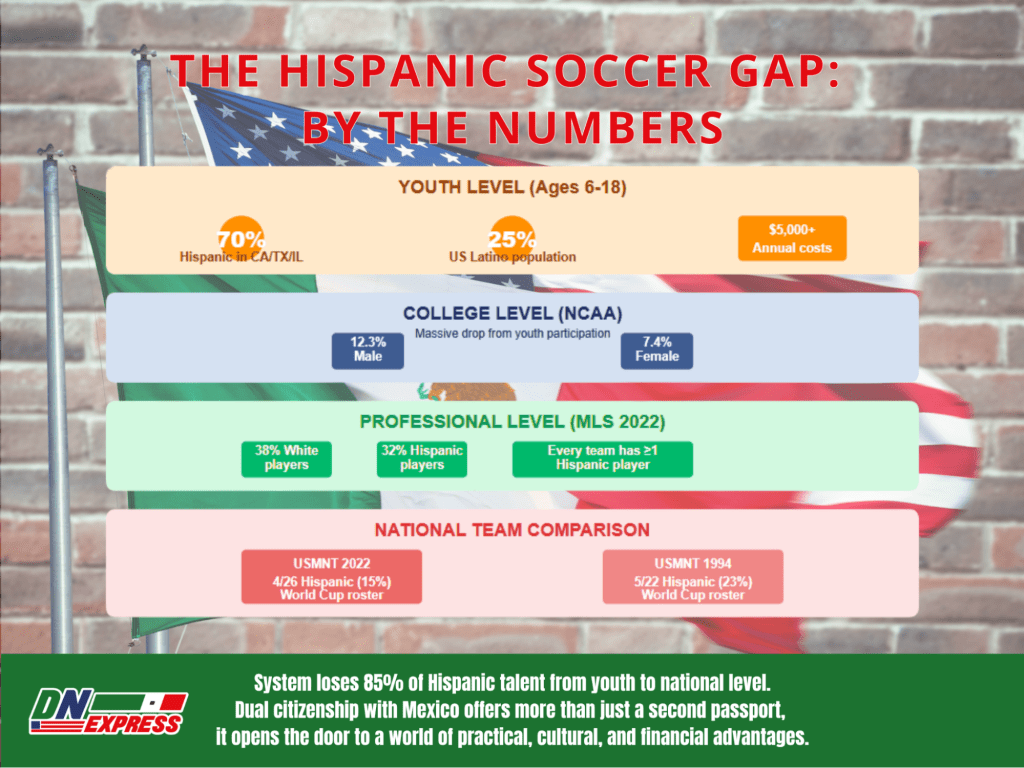
Why Doble Nacionalidad Express Is Trusted by Players & Families
When it comes to dual citizenship, especially for athletes, timing and accuracy can make or break a career. That's why families, coaches, and even pro clubs turn to Doble Nacionalidad Express, because getting it right the first time matters.
Athlete-Focused Legal Support
We specialize in sports-based nationality cases. We've successfully helped:
- U.S.-born players sign with Liga MX and MLS academies
- Families fix documents in time for national team tournaments
- Dual nationals gain eligibility before FIFA deadlines
We know the pressure athletes are under, and we're here to make sure paperwork doesn't stand in the way of performance. Our experienced attorneys provide comprehensive legal services tailored to athletes' unique needs.
Benefits of Working with DNExpress
- Remote, Fast-Track Service: No need to wait months for a consulate appointment, we handle everything through trusted civil registry channels in Mexico.
- Licensed Lawyers, Proven Credentials, Documented Success: Our team includes licensed binational attorneys who specialize in nationality law, not vague “consultants” or unlicensed middlemen.
- Confidential and Athlete-Safe: Whether it's a 16-year-old prodigy or a rising MLS star, we treat every case with privacy and discretion.
Why You Shouldn't DIY This Process
- One error = lost opportunity: A misspelled name or missing record could disqualify a player from FIFA eligibility or block a club transfer.
- Consulate Confusion: Families who try to go through the consulate often face long lines, inconsistent instructions, and bureaucratic dead-ends.
- Missed Deadlines = Missed Dreams: We've seen athletes lose chances to represent Mexico because their paperwork wasn't submitted on time. Don't let that be you.
When the stakes are high, there's no room for guesswork.
Let DNExpress handle the legal side, so you can focus on the game. For common questions, check our frequently asked questions page, and remember to consider potential drawbacks before making your final decision.
Claiming Your Place On & Off the Field
Whether you're a player with big dreams, a parent guiding your child, or a fan cheering from the sidelines, identity matters. And for Hispanic American athletes, that identity goes beyond the game. It's culture, family, and legacy, wrapped in a jersey and a flag.
Today's generation is rewriting the rules. They're choosing heritage over hype, meaning over marketing. But even the most talented player can be sidelined if the paperwork doesn't work.
That's where we come in.
We believe your passion should never be held back by paperwork. We've helped families across the U.S. fix legal issues, secure Mexican nationality, and unlock the future they deserve, on their terms.

Ready to Take Action?
Schedule a Free Case Review or Message Us on WhatsApp to:
✅ Fix your documents (even if the consulate told you no)
✅ Claim Mexican nationality for yourself or your child
✅ Represent the country that represents you
Your heritage is your strength. Let's make sure your legal identity matches it.
Frequently Asked Questions
Who is the most famous Hispanic American soccer player?
Claudio Reyna paved the way, and now his son, Gio Reyna, carries the torch as one of the most recognized Hispanic American stars in the U.S. national team setup.
How many Hispanic soccer players are in the U.S.?
While Hispanic players dominate youth leagues (especially in states like CA, TX, and IL), they remain underrepresented at the pro and national levels due to systemic barriers.
Can a U.S.-born player represent Mexico?
Yes, if they have at least one parent or grandparent born in Mexico and complete the legal nationality process.
They must also hold a valid CURP and be registered with Mexico's national registry.
What is CURP and why does it matter?
CURP is Mexico's national identification number. Without it, players cannot register with Liga MX or represent Mexico in official matches, even if they already have a Mexican passport.
Does risk exist in doing the paperwork on your own?
Yes. Missing documents, name mismatches, or delays with the consulate can disqualify players from call-ups or contracts. Professional legal support reduces the risk of costly mistakes.



